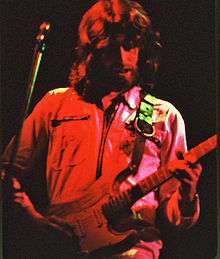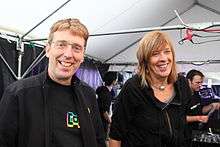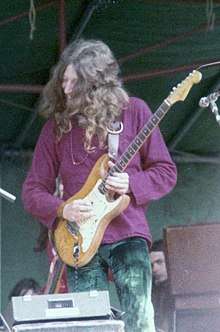Steve Hillage
Stephen Simpson Hillage (born 2 August 1951)[2] is an English musician, best known as a guitarist.[3] He is associated with the Canterbury scene and has worked in experimental domains since the late 1960s. Besides his solo recordings he has been a member of Khan, Gong and System 7.
Steve Hillage | |
|---|---|
 Hillage in concert, circa 1978 | |
| Background information | |
| Birth name | Stephen Simpson Hillage |
| Born | 2 August 1951 Chingford, Essex, England |
| Genres | Progressive rock, jazz fusion, psychedelic rock, electronica, Canterbury scene, space rock[1] |
| Instruments | Guitar, keyboards, vocals |
| Years active | 1967–present |
| Labels | Virgin/EMI Records |
| Associated acts | Uriel (also known as Arzachel), Khan, Gong, The Orb, System 7, Clearlight |
History
Early career
Hillage was born in Chingford, which was then in Essex but is now part of Greater London. Whilst still at school, he joined his first band, a blues rock band called Uriel, with Dave Stewart, Mont Campbell and Clive Brooks.[2] The band split up in 1968 with the other members going on to form Egg, but they briefly re-united under assumed names to record the album Arzachel in 1969. Hillage also guested on Egg's 1974 album The Civil Surface.[3]
In 1969, Hillage began studies at the University of Kent in Canterbury, befriending local bands Caravan and Spirogyra and occasionally jamming with them. Meanwhile, he wrote songs and, by late 1970, had accumulated enough material for an album. Caravan put him in touch with their manager Terry King, who got Hillage signed with Deram on the basis of a demo of his material recorded with the help of Dave Stewart of Egg. In early 1971, Hillage formed Khan with bassist/vocalist Nick Greenwood, formerly of Crazy World of Arthur Brown.[2] Although future Gong and Hatfield and the North drummer Pip Pyle was involved in the early stages, the line-up finally settled with the inclusion of organist Dick Heninghem and drummer Eric Peachey,[2] both of whom had recently collaborated on Greenwood's solo project Cold Cuts, recorded in California in 1970 but belatedly released in 1972.
Following a series of concerts throughout 1971, several of them supporting label mates Caravan, Khan began recording their debut album in November, by which time Heninghem had left, forcing Hillage to bring in his former bandmate Dave Stewart to play the keyboard parts.[2] By the time Space Shanty came out in May 1972, Canadian Val Stevens (formerly of Toronto's popular soul-rock band Grant Smith & The Power) had filled the vacancy, making his debut on a short European tour (including a televised appearance at the Montreux Festival) and continuing with a UK tour supporting Caravan in June.
By then, musical disagreements between Hillage and Greenwood culminated with the latter's departure. Hillage decided to form a new line-up with a slightly different direction, retaining the services of Peachey and asking Stewart back, and adding Nigel Griggs (later of Split Enz) on bass. New compositions by Hillage and Stewart were added to the repertoire, including "I Love Its Holy Mystery", which would form the basis of Hillage's later Solar Musick Suite. Hillage broke up the band in October 1972.
Hillage promptly joined Kevin Ayers' new live band Decadence, participating in Ayers' 1973 album Bananamour (Harvest, May 1973) and touring the UK and France for two months. Having in the meantime become a fan of Gong after meeting Daevid Allen, hearing Camembert Electrique and Allen's solo album Banana Moon, as well as meeting his longtime partner Miquette Giraudy through Allen, Hillage stayed in France after the Ayers tour to join the band.
In January 1973, he took part in the sessions for Flying Teapot, the first installment of the "Radio Gnome" trilogy, and soon after graduated to full-time membership with the departure of bassist/lead guitarist Christian Tritsch. The 'classic' line-up of Gong was now in place, with Daevid Allen, Gilli Smyth, Didier Malherbe, Tim Blake, Mike Howlett and Pierre Moerlen, and recorded two further albums, Angels Egg and You (the latter also featuring Giraudy).[3]
In June 1973, Hillage (along with Pierre Moerlen) participated in the debut live performance of Mike Oldfield's Tubular Bells at Queen Elizabeth Hall. Both Hillage & Moerlen also took part in a live-in-studio performance filmed for the BBC's Second House series, filmed in November 1973.[4] The BBC performance is available on Oldfield's Elements DVD.
After Allen left Gong abruptly in April 1975, Hillage stayed on as the band's sole guitarist, but soon found this position increasingly uncomfortable, and by the year's end had jumped ship himself to launch his solo career full-time, having performed as a guest (with Giraudy) on Gong's first album without Allen, Shamal on only two of the album's six tracks.
His motivation to do so was fueled by the success of his solo album Fish Rising, recorded in late 1974 while still in Gong and featuring most of his bandmates, as well as former bandmate in Khan, Dave Stewart.[2] His next effort L album was recorded in the United States using musicians from Todd Rundgren's Utopia, and on its release Hillage formed a touring band which toured in late 1976.[2] During the latter half of the 1970s, Hillage made a name for himself as a guitarist and prog-rock/fusion composer and performer. 1977's Motivation Radio, with its shorter tracks, marked a departure from the long instrumental workouts of previous efforts,[2] but 1978's Green, co-produced by Pink Floyd's Nick Mason, was a return to his earlier work.
These 1970s works (tacitly in collaboration with his longtime girlfriend Miquette Giraudy) blended complex studio production techniques with dreamscape anthems.[2] Hillage spent time in the Ladbroke Grove area of London, home of the UK Underground and worked with Nik Turner ex roadie for, then later saxophonist of early Hawkwind.
Later career
In 1978, Hillage played onstage with punk band Sham 69 during their performance at the Reading Festival,[5] and in 1979, he played guitar on "Nuclear Waste" by The Radio Actors with lead vocals by Sting.
Also in 1979, Hillage released Open on Virgin Records, featuring Dave Stewart, Jean-Philippe Rykiel, Paul Francis and Andy Anderson.
During the 1980s, Hillage worked as a record producer, working for artists such as Simple Minds, It Bites, Murray Head, Nash the Slash, Real Life, Cock Robin, Tony Banks and Robyn Hitchcock.[3] He returned to producing in the 1990s, working on The Charlatans 1994 album, Up to Our Hips.
After hearing the likes of The Orb playing his 1979 ambient record Rainbow Dome Musick, Hillage and Giraudy began performing in the early 1990s as ambient dance act: System 7.[3] They soon became part of the underground dance scene in London and Hillage was also a key figure in getting the Glastonbury Festival to recognise the dance scene and set up the Dance Tent, which he programmed in its first year.[6] Hillage also produced in the 1990s a raï musical show called '1, 2, 3 Soleils', featuring Algerian singers Faudel, Rachid Taha and Khaled. He also arranged many songs of Latifa.

In November 2006, he made a surprise return to the Gong fold when he and Giraudy performed with (most of) the "classic era" lineup of Gong performing a set consisting almost entirely of material from the Radio Gnome Trilogy and Camembert Electrique at the Gong Unconvention at the Melkweg in Amsterdam. Hillage and Giraudy also performed in various guises over the weekend. First as the "Steve Hillage Band" with synthesizer player Basil Brooks, Gong bassist Mike Howlett and current Gong drummer Chris Taylor, playing mostly material from Hillage's 1970s solo albums. They also performed a set as System 7. Hillage, along with Daevid Allen and up to 10 or more guitarists, also contributed to the "Glissando Orchestra", a one-hour plus performance where a number of guitarists all played mostly continuous drone notes with some gentle melodic lines overlaid.[7]
In January 2007, four of his albums – Fish Rising, L, Motivation Radio and Rainbow Dome Musick – were released in the UK remastered on CD, each, except the latter, with previously unreleased bonus tracks. In February 2007, Green, Live Herald, Open and For To Next/And Not Or followed, similarly remastered with bonus content.
Hillage and Giraudy's participation in the Gong Unconvention was reprised in a small number of concerts held by Gong in London in June 2008, where Hillage and Giraudy were among the line-up which also included Daevid Allen, Gilli Smyth, and Mike Howlett. At these concerts, Hillage would often open the show performing "Steve Hillage Band" material, as he had at the Uncon. Hillage and Giraudy worked most recently on their 2009 album 2032 (which Hillage also produced), and has continued to tour with the band throughout 2009 and 2010. After the 2010 tour, citing musical differences, Steve & Miquette again parted ways with Gong.[8]
His next association with Gong was a guest guitar solo on the title track of their 2016 album "Rejoice! I'm Dead", their first album recorded after the death of Daevid Allen. Though no longer featuring any original members, the current lineup of Kavus Torabi (guitar/vocals), Fabio Golfetti (guitar/vocals), Dave Sturt (bass), Ian East (saxophone/flute) and Cheb Nettles (drums/vocals) had the blessing of Allen (along with the blessing of other surviving members) to continue using the Gong name. Soon after, Hillage made a few guest appearances at Gong gigs (sometimes being billed as Gong featuring Steve Hillage), culminating in late 2018 with the announcement that Hillage & Giraudy had tapped the current lineup of Gong to be their backing band/opening act for a series of Steve Hillage Band shows in 2019. Continued touring plans for 2020, however, were halted in the wake of the Covid-19 pandemic. [9]
Hillage also collaborated with Ozric Tentacles on the 2004 album Spirals in Hyperspace.
Hillage played live with Hawkwind in December 2015 at The Coronet, London, and also played a rapturously received one-hour set with Dave Brock and Tim Blake of the band at Hawkwind's Hawkeaster festival in Morecambe, Lancashire at Easter, 2018.
"Light in the Sky", from his 1977 album Motivation Radio, was used as the theme for The Sunday Night Project on Channel 4.
Hillage played on a cover of Elton John's "Rocket Man" on William Shatner's 2011 release Seeking Major Tom.
Hillage won the "Visionary" award at the 2013 Progressive Music Awards.[10]
Discography
- (1975) Fish Rising – UK No. 33
- (1976) L – UK No. 10
- (1977) Motivation Radio – UK No. 28
- (1978) Green – UK No. 30
- (1979) Live Herald – UK No. 54
- (1979) Rainbow Dome Musick – UK No. 48
- (1979) Open – UK No. 71
- (1980) Aura
- (1982) For To Next – UK No. 48
- (1982) And Not Or
- (1991) Ggggong-Go Long (Double Album)
- (1992) BBC Radio 1 Live: Steve Hillage Live in Concert
- (2003) Light in the Sky
- (2004) Live at Deeply Vale Festival 1978
- (2008) Evan Marc & Steve Hillage – Dreamtime Submersible (Somnia Records)[3][11]
- (2015) Madison Square Garden 1977 (Cleopatra Records)
References
- "allmusic ((( Aura > Overview )))". Allmusic. Retrieved 29 July 2019.
- Colin Larkin, ed. (1997). The Virgin Encyclopedia of Popular Music (Concise ed.). Virgin Books. p. 602. ISBN 1-85227-745-9.
- Strong, Martin C. (2000). The Great Rock Discography (5th ed.). Edinburgh: Mojo Books. pp. 447–448. ISBN 1-84195-017-3.
- "Mike Oldfield (with Mick Taylor, Steve Hillage and members of Henry Cow, Gong and Soft Machine) – Tubular Bells (Live BBC Video 1973)". MOG. Archived from the original on 23 August 2009. Retrieved 23 May 2009.
- "Steve HILLAGE-Chronology". Calyx.perso.neuf.fr. Retrieved 31 March 2012.
- "Steve Hillage – Interview". Inspiralled.net. Retrieved 31 March 2012.
- "Gig History: 2006". Planet Gong. Retrieved 31 March 2012.
- "Interview with Steve Hillage". The Rocktologist.com. 26 May 2011. Retrieved 19 March 2015.
- https://www.gongband.com/2018/12/steve-hillage-band/
- "Prog Awards 2013 – The Winners!". Prog Rock Magazine. 3 September 2013. Archived from the original on 5 September 2013. Retrieved 4 September 2013.
- Roberts, David (2006). British Hit Singles & Albums (19th ed.). London: Guinness World Records Limited. p. 253. ISBN 1-904994-10-5.
